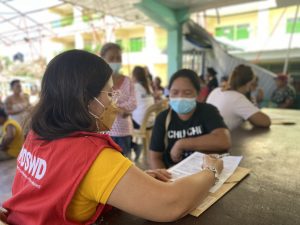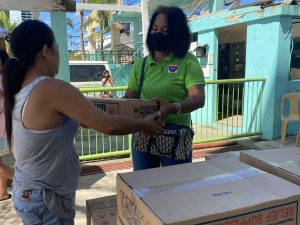Unstable network signal, zero electricity, on-and-off flow of potable water – with the adversities caused by Typhoon Odette last December16, 2021, the residents of Surigao City welcomed the new year with a sad heart.
In 2017, Surigao City was also stricken by a 6.7 magnitude earthquake which wreaked havoc to Surigaonons, more so the marginalized sectors of the City and neighboring municipalities. However, amid the circumstances, the people remained positive, not the Omicron-variant kind, but in their attitudes in life.

Marijoy Lopez, a resident of Barangay Sabang, cannot forget what happened on the day when the typhoon hit the country.
“Pag-abot sa bagjo, nabahaan kami, posible mapatay tungod kay nahugmak naman an amo bayay. Majaw gani kay nakabakwit kami dajon, iban an ako mga bata. Sukad-sukad, amo pa gajud kami nakahuya nan evacuation center, pasalamat kami sa DSWD na naghatag nan relief goods diri kay kalisod gajud sa pangita kuman (When the typhoon hit, our place was flooded, and it was possible that we could die because our house collapsed. It is a good thing that we are able to evacuate immediately, together with my kids. Ever since, it is our first time living in the evacuation center, we thank DSWD for the delivery of relief goods because it is really a difficult situation now),” she recalled.
The Department of Social Welfare and Development (DSWD), being the vice chairperson for disaster response under the National Disaster Risk Reduction and Management Council (NDRRMC), is mandated to provide emergency services support and public assistance during or immediately after a disaster in order to save lives, reduce health impacts, ensure public safety, and meet the basic subsistence needs of the affected individuals.

Moreover, the Republic Act No. 10121 or the Philippines Disaster Risk Reduction and Management Act of 2010 states that disaster response should be “predominantly focused on immediate and short-term needs and is sometimes called “disaster relief.” This was what the DSWD Field Office Caraga immediately do.
To date, a total of 1,000 purified drinking water (10L), 300 plastic mats, and 13,980 family food packs (FFPs) amounting to 7.8 million have already been augmented to the LGU of Surigao City. Each FFP contains 6 kilos of rice, 10 canned goods, and 10 energy drinks easily available for a family of five (5) members for two days’ consumption.
Meanwhile, the creation of Sub-Emergency Operations Center composed of regional and field staff was done to perform the following functions:
- Coordinate with Local Government Units on their requests, schedule of welfare goods distribution and other concerns;
- Conduct rapid assessment, data validation and collection;
- Provide technical assistance and monitor camp coordination and camp management and IDP protection;
- Facilitate other humanitarian assistance; among others.
While the DSWD staff assigned in the field have also been affected, their public service with kalinga at pagmamahal was never put to a halt. In fact, they immediately assisted in the conduct of rapid assessment to internally displaced persons (IDPs), orientation and crash course on Camp Coordination and Camp Management (CCCM) to barangay officials, and validation of Disaster Assistance Family Access Card (DAFAC) of evacuees.
The Agency isn’t alone in providing aid to affected families and communities. Numerous local and international organizations, both in public and private, have extended their helping hands to the severely affected Surigaonons.
All in all, even with the worldwide crisis brought about by the COVID-19 and the onslaught of TY Odette, the convergence of the city government, the support of the Agency, and the resiliency of the affected Surigaonons shall never cease, and is always on point. Even in calamities, may it be fire, earthquake, or super typhoons, the city shall overcome, and rise above it.
As phrased by the City Administrator Atty. Jerry Centro, “The less fortunate should have more from the government.”###(Social Marketing Section/DSWD Field Office Caraga)

